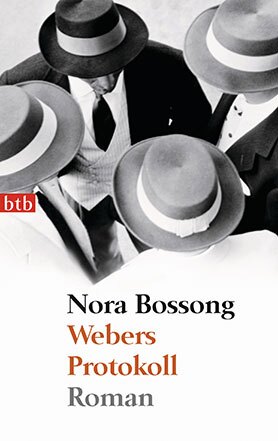Nora Bossong
Webers Protokoll
[Weber's record]
- Frankfurter Verlagsanstalt
- Frankfurt am Main 2009
- ISBN 978-3-627-00159-9
- 284 Pages
- Publisher’s contact details
Nora Bossong
Webers Protokoll
[Weber's record]
Sample translations
Review
Ten years ago Nora Bossong would have been labeled as a “Fräuleinwunder”. Today, the 27-year-old can pass simply as an extremely gifted young writer. Having first garnered attention with her poetry before debuting as a novelist with Gegend in 2006, Bossong has now startled her readers with a plot that is rather unusual for authors her age. Weber’s Record is the intricate and elaborately fragmented story across several time periods of a diplomat who, in 1943, embezzles money as a German vice-consul in Milan and comes under the scrutiny of his new boss, an NS hardliner. In order to save his neck, he takes on a job helping people to escape Nazi Germany, but when these transactions get him into even deeper trouble, he defects to Switzerland. Following the war, his past catches up to him as he attempts to join the German Foreign Service.
Nora Bossong was inspired to write the novel after documents were accidentally discovered. Through painstaking research she has acquired not only a cogent understanding of history but also a remarkable flair for the atmosphere of the epochs and milieus she portrays. She alternates seamlessly between the Nazi era, the German post-war economic boom, and the present and skillfully allows a young narrator to reconstruct the case during an argument she has with an aged diplomat. Bossong moves elegantly from one scene to the next and consciously blurs the fine line between fiction and official records. The author is principally interested, however, in the yo-yoing of her protagonist, the hypochondriac and opportunistic Dr. Konrad Weber, whose imaginary eye problems illustrate – slightly too symbolically, perhaps – his fear of the truth and his preference for avoiding reality. Readers are thus meant to see Weber as a representative of the silent majority of his fellow citizens.
The phrase “Weber is certain” appears throughout the novel with a frequency that is hard to miss, yet implies the exact opposite. This timorous career man is incapable of gaining a sound understanding neither of himself and what motivates him, the incidents taking place around him, the political and social reality of the times, nor of the aims and motives of the people he deals with. Readers are thus left to speculate about the character of a man who performs his job scrupulously only to embezzle large sums of money, who assists Jews and opponents of the regime out of self-interest, not conviction, and who, though not a Nazi sympathizer, only fully distances himself from the regime in order to save his own skin.
Nora Bossong has created the shimmering polyvalence of her anti-hero and various minor characters with remarkable empathy and precision, while rooting them in a sophisticated narrative form. What’s more, she has risked interweaving the true story of Eugenio Pacelli, who as Pope Pius XII played a dubious and still controversial role during the Third Reich, with Weber’s own case. The chess game winding its way through the novel is an apt metaphor for an author of such combinative talents and highlights the intellectual ambitions of her undertaking. Finally, the recurring motif of the birdcage can be read not only as a reference to the self-contained system the characters are snared in, but also as an image of the delicate narrative construction in which readers themselves feel eerily trapped from cover to cover.

Nora Bossong was inspired to write the novel after documents were accidentally discovered. Through painstaking research she has acquired not only a cogent understanding of history but also a remarkable flair for the atmosphere of the epochs and milieus she portrays. She alternates seamlessly between the Nazi era, the German post-war economic boom, and the present and skillfully allows a young narrator to reconstruct the case during an argument she has with an aged diplomat. Bossong moves elegantly from one scene to the next and consciously blurs the fine line between fiction and official records. The author is principally interested, however, in the yo-yoing of her protagonist, the hypochondriac and opportunistic Dr. Konrad Weber, whose imaginary eye problems illustrate – slightly too symbolically, perhaps – his fear of the truth and his preference for avoiding reality. Readers are thus meant to see Weber as a representative of the silent majority of his fellow citizens.
The phrase “Weber is certain” appears throughout the novel with a frequency that is hard to miss, yet implies the exact opposite. This timorous career man is incapable of gaining a sound understanding neither of himself and what motivates him, the incidents taking place around him, the political and social reality of the times, nor of the aims and motives of the people he deals with. Readers are thus left to speculate about the character of a man who performs his job scrupulously only to embezzle large sums of money, who assists Jews and opponents of the regime out of self-interest, not conviction, and who, though not a Nazi sympathizer, only fully distances himself from the regime in order to save his own skin.
Nora Bossong has created the shimmering polyvalence of her anti-hero and various minor characters with remarkable empathy and precision, while rooting them in a sophisticated narrative form. What’s more, she has risked interweaving the true story of Eugenio Pacelli, who as Pope Pius XII played a dubious and still controversial role during the Third Reich, with Weber’s own case. The chess game winding its way through the novel is an apt metaphor for an author of such combinative talents and highlights the intellectual ambitions of her undertaking. Finally, the recurring motif of the birdcage can be read not only as a reference to the self-contained system the characters are snared in, but also as an image of the delicate narrative construction in which readers themselves feel eerily trapped from cover to cover.
Translated by Franklin Bolsillo Mares

By Kristina Maidt-Zinke
Kristina Maidt-Zinke is a book and music critic at the Süddeutsche Zeitung and also writes reviews for Die Zeit.
